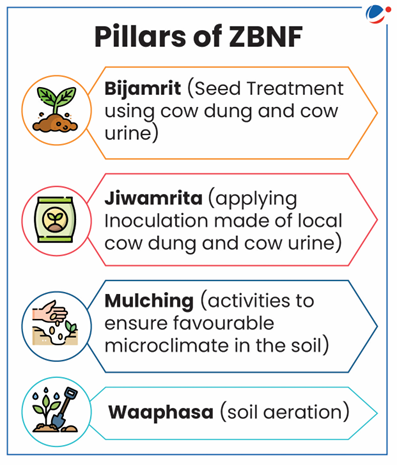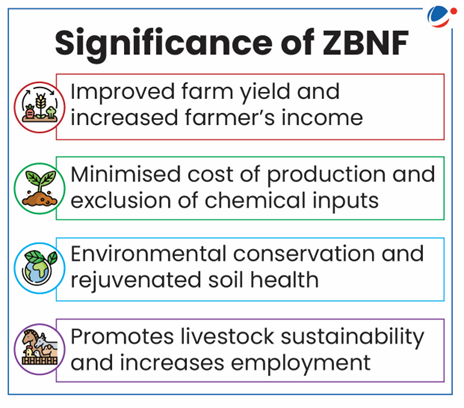Why in the News?
A research paper by the National Bank for Agriculture and Rural Development (NABARD) and the Indian Council for Research on International Economic Relations (ICRIER) has cautioned regarding “a complete switch” to natural farming
More about the news
- Research was conducted as part of agriculture project of ICRIER and financially supported by NABARD.
- The paper recommended long-term experimentation before declaring ZBNF a nationwide practice.
About Zero Budget Natural Farming (ZBNF)
- Formulated by Subhash Palekar in India on the basis of four essential elements namely Beejamrit, Jeevamrit, Acchadana, and Waaphasa (refer the info-graphic)
- It was first practiced by a Japanese farmer and philosopher, Masanobu Fukuoka.
- Other important principles in of ZBNF include,
- Intercropping, of a monocot and dicot crop on the same field
- Contours and bunds, to preserve rainwater
- Revival of Local species of earthworms through increased organic matter
- Use of Dung of indigenous cow (Bos-indicus) with highest concentrations of micro-organisms

- Promotes the usage of natural farming techniques in which farming is done without-
- Use of chemicals and
- Use of credit or spending any money on purchased inputs
- It was renamed as Bhartiya Prakritik Krishi Padhati (BPKP) as a sub-scheme under Paramparagat Krishi Vikas Yojana (PKVY), which aims at promoting Organic farming and soil health.
- BPKP is a Centrally Sponsored Scheme, initiated for a period of six years (2019-25).
- Aims to cover 12 Lakh ha under ZBNF in 600 major blocks of the country.
- Provides financial assistance of Rs.12,200/ha for 3 years for Cluster formation and Capacity building.
- BPKP is a Centrally Sponsored Scheme, initiated for a period of six years (2019-25).
- Status of ZBNF in India
- Currently eleven states practice ZBNF in over 6.5 Lakh hectares.
- States like Andhra Pradesh (AP) has adopted ZBNF over 1 lakh hectares of land and aims to convert its entire agriculture land pool (80 lakh hectares) under ZBNF by 2027.

Issues in ZBNF
- Labour intensive form of agriculture, which requires significant work in the farmland and livestock maintenance.
- Debatable concept of Zero cost input as it is impossible to produce crops without cost inputs as freely available inputs like rainwater and family labour also adds to the opportunity cost.
- Yield variations will become a common phenomenon as the natural factors during a particular season would completely decide the actual output.
- Indigenous cow breeds is an integral requirement for the farming practice and they incur high maintenance cost with low milk yield to the farmer.
- No independent studies to validate the claims that ZBNF plots have a higher yield than non-ZBNF plot.
Conclusion
There is need to emphasis on scientific studies, across the country to find efficacy and efficiency of the farming technique across various landscapes and ecosystems. Also, impetus to the indigenous cow breeds (like Punganur Cow, Red Sindhi etc.) can also be done through various government and cooperative initiatives thereby increasing their numbers.
Comparison between Natural farming, Organic farming and Inorganic farming | ||
Natural farming | Organic farming | Inorganic farming |
Advocates zero external intervention like tilling, fertilisers, etc | Advocates minimal intervention. | Advocates maximum intervention using tillers, fertilisers etc. |
Natural laws are applied to agricultural activities. | Follows accepted principles and practices. | Modifies the farm activities to improve the output |
No usage of external fertilisers | Organic fertilisers are allowed | Uses Chemical fertilisers |
Apart from natural manure, it encourages decomposition of organic matter by microbes and earthworms | Manures like compost, vermin-compost are used on farmlands | May or may not use manures as they mostly utilise Chemicals for nutrients |
Low cost, as it eliminates external input costs and machineries usage. | Expensive as compared to other forms | Comparatively less costly as compared to organic farming due to less usage of manpower |
Encourages usage of local varieties of seeds | Encourages certified organic seeds | Encourages usage of hybrid or genetically modified seeds |







